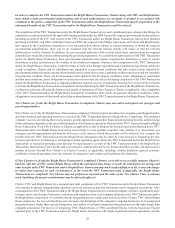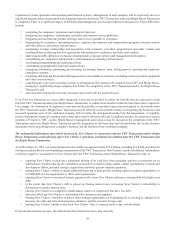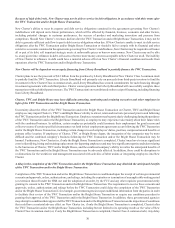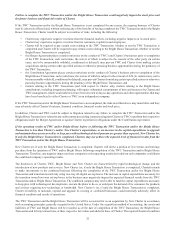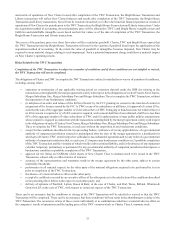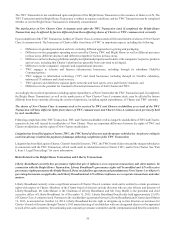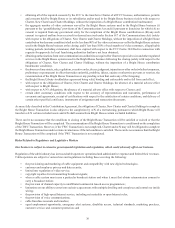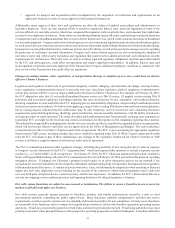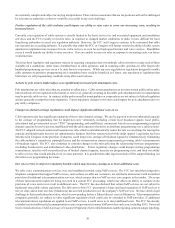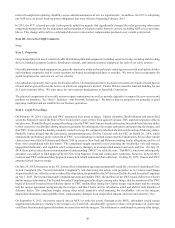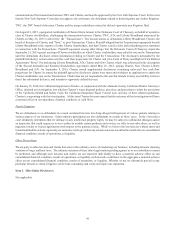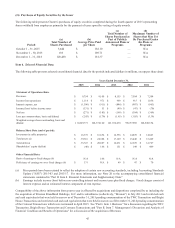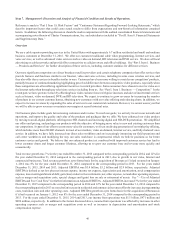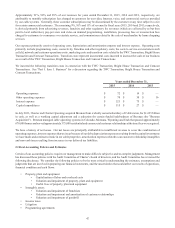Charter 2015 Annual Report Download - page 53
Download and view the complete annual report
Please find page 53 of the 2015 Charter annual report below. You can navigate through the pages in the report by either clicking on the pages listed below, or by using the keyword search tool below to find specific information within the annual report.38
often demand concessions or other commitments as a condition to renewal. In some instances, local franchises have not been
renewed at expiration, and we have operated and are operating under either temporary operating agreements or without a franchise
while negotiating renewal terms with the local franchising authorities.
The traditional cable franchising regime has undergone significant change as a result of various federal and state actions. Some
state franchising laws do not allow incumbent operators like us to opt into favorable statewide franchising as quickly as new
entrants, and often require us to retain certain franchise obligations that are more burdensome than those applied to new entrants.
We cannot assure you that we will be able to comply with all significant provisions of our franchise agreements and certain of our
franchisers have from time to time alleged that we have not complied with these agreements. Additionally, although historically
we have renewed our franchises without incurring significant costs, we cannot assure you that we will be able to renew, or to
renew as favorably, our franchises in the future. A termination of or a sustained failure to renew a franchise in one or more key
markets could adversely affect our business in the affected geographic area.
Our cable system franchises are non-exclusive. Accordingly, local and state franchising authorities can grant additional
franchises and create additional competition for our products, resulting in overbuilds, which could adversely affect results of
operations.
Our cable system franchises are non-exclusive. Consequently, local and state franchising authorities can grant additional franchises
to competitors in the same geographic area or operate their own cable systems. In some cases, local government entities and
municipal utilities may legally compete with us on more favorable terms. The FCC recently adopted an order (currently under
appeal) rejecting state laws in North Carolina and Tennessee that restricted municipalities from providing broadband service. In
addition, potential competitors (like Google) have recently pursued and obtained local franchises that are more favorable than the
incumbent operator’s franchise. As a result, competing operators may build systems in areas in which we hold franchises.
The FCC has adopted rules that streamline entry for new competitors (particularly those affiliated with telephone companies) and
reduce franchising burdens for these new entrants. At the same time, a substantial number of states have adopted new franchising
laws, principally designed to streamline entry for new competitors, and often provide advantages for these new entrants that are
not immediately available to existing operators. Broadband delivery of video content is not necessarily subject to the same
franchising obligations applicable to our traditional cable systems.
The FCC administers a program that collects Universal Service Fund contributions from telecommunications service providers
and uses them to subsidize the provision of telecommunications services in high-cost areas and to low-income consumers and the
provision of Internet and telecommunications services to schools, libraries and certain health care providers. A variety of regulatory
changes may lead the FCC to expand the collection of Universal Service Fund contributions to encompass Internet service providers.
The FCC already has begun to redirect the expenditure of some Universal Service Funding to broadband deployment in ways that
could assist competitors in competing with our services.
Local franchise authorities have the ability to impose additional regulatory constraints on our business, which could further
increase our expenses.
In addition to the franchise agreement, cable authorities in some jurisdictions have adopted cable regulatory ordinances that further
regulate the operation of cable systems. This additional regulation increases the cost of operating our business. Local franchising
authorities may impose new and more restrictive requirements. Local franchising authorities who are certified to regulate rates
in the communities where they operate generally have the power to reduce rates and order refunds on the rates charged for basic
service and equipment.
Tax legislation and administrative initiatives or challenges to our tax positions could adversely affect our results of operations
and financial condition.
We operate cable systems in locations throughout the United States and, as a result, we are subject to the tax laws and regulations
of federal, state and local governments. From time to time, various legislative and/or administrative initiatives may be proposed
that could adversely affect our tax positions. There can be no assurance that our effective tax rate or tax payments will not be
adversely affected by these initiatives. Certain states and localities have imposed or are considering imposing new or additional
taxes or fees on our services or changing the methodologies or base on which certain fees and taxes are computed. The federal
Internet Tax Freedom Act, which prohibits many taxes on Internet access service, will expire October 1, 2016, unless it is renewed
by Congress. Potential changes include additional taxes or fees on our services which could impact our customers, combined
reporting and other changes to general business taxes, central/unit-level assessment of property taxes and other matters that could
increase our income, franchise, sales, use and/or property tax liabilities. In addition, federal, state and local tax laws and regulations


